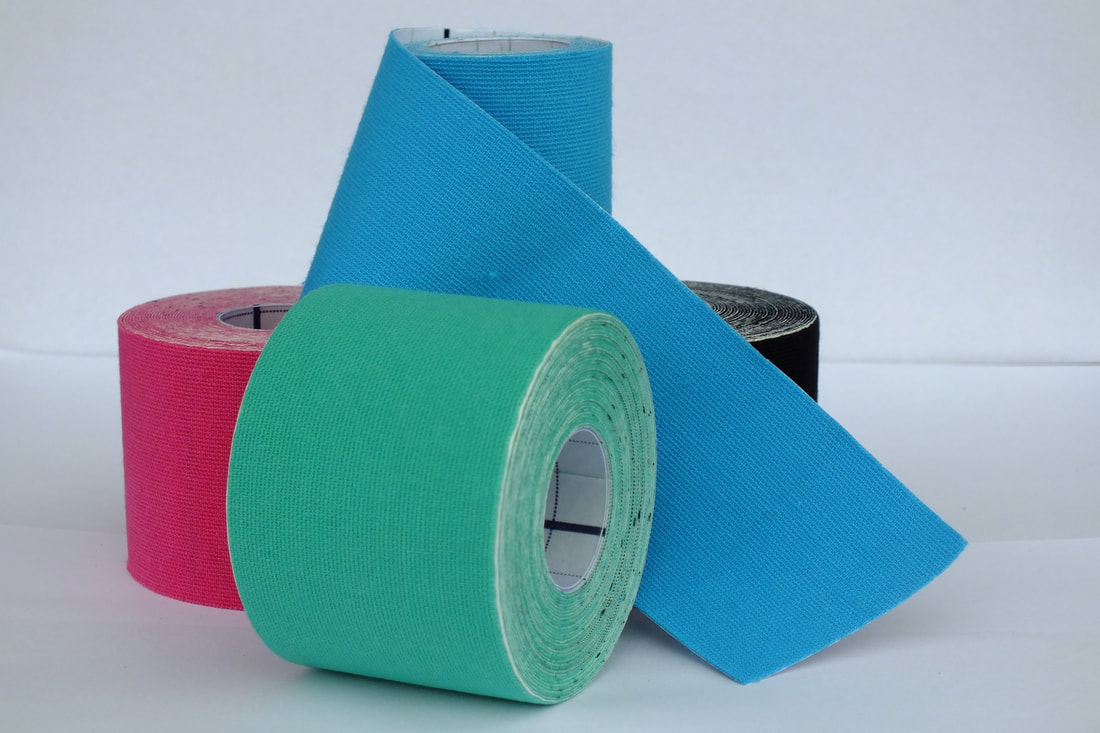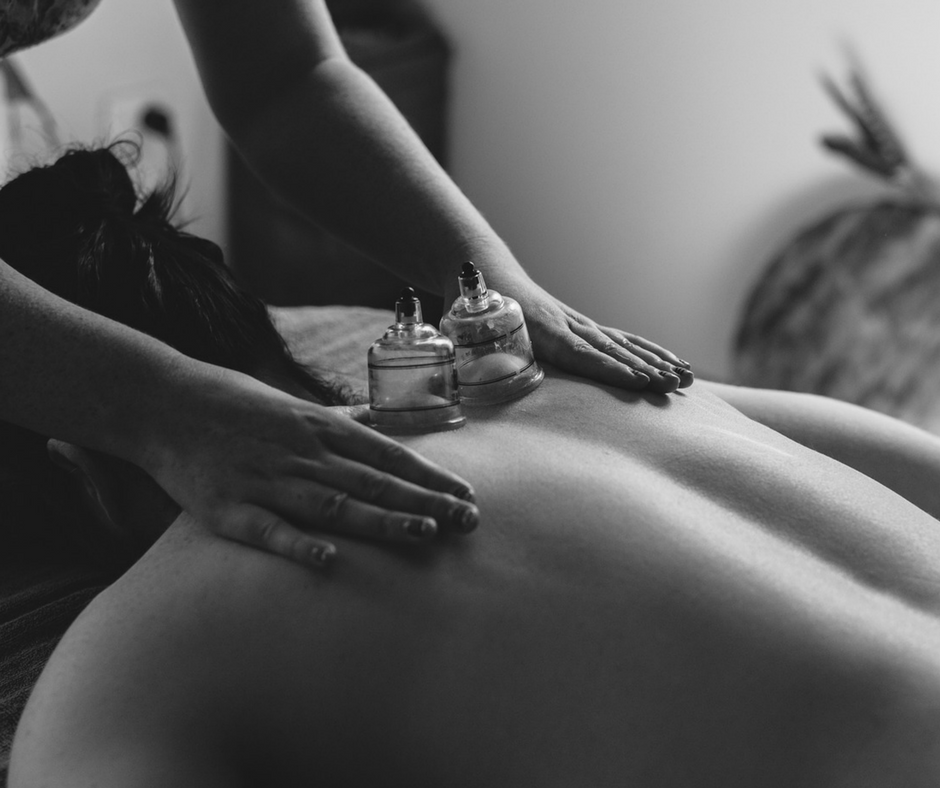|
Taping – The Whys And Hows One of the coolest tools for supporting your muscles (or at least I think it’s cool!) is taping. Let’s have a look at what taping is, what it can help, and if it’s right for you. What is taping?
Put simply, taping is when we use a specially designed tape to support your muscles and/or joints. It’s not a treatment to use in place of your healthcare practitioner. But it is a tool that we use to help support your body between treatments. What can taping help with? It has a variety of applications! As a myotherapist, I use taping to: Stabilise joints that are injured or weak Increase proprioception, or location awareness, of the body part Aid in recovery from acute and chronic injury Reduce fluid and swelling in an injured body part Enhance athletic performance and prevent injuries It can be helpful for a variety of people, from athletes to people with chronic pain and those with an acute injury. What types of tapes are there? There are two main types of tape that I use in the clinic: rigid tape and kinesiotape. Rigid tape is just what it sounds like. The goal is to hold the joint in a specific position for a period of time so that it is able to recover. Kinesiotape is a newer kind of tape that moulds to the skin and moves with the body. It is less restrictive, and is helpful for many applications. It’s particularly useful for helping people to be aware of how they are holding their body. When we’re injured, we tend to hold ourselves wherever is least painful – but that’s not always the best location for recovery! This tape helps you to be aware of that, so you can correct it. Kinesiotaping also has a pain reducing effect by applying a constant stimulation to the skin. Its applied with the tight muscle in a stretched position, so that when you return to your normal posture the tape holds the muscle slightly stretched. You might see or feel the tape pucker - that is what its designed to do! Can I do my own taping? I’m not your mum. If you want to DIY your taping, that’s up to you. But there are benefits to getting it done professionally: 1. You get taped with high quality tape 2. If it’s a repeat taping, I will quickly reassess to see whether a different taping technique may be better – for example, I might use rigid tape for the first taping, then switch to kinesiotaping. I might even use both! 3. I make sure that the injured part is positioned correctly 4. You don’t have to tape yourself one-handed, or twist around to tape anywhere on your back half! Taping aftercare There are things you can do to make sure your tape lasts and your skin stays happy: To make sure tape adheres properly, it’s best to avoid exercise or showering for 1-2 hours after taping. Although you can shower with your tape, it’s best to let it dry properly. Otherwise, it might get a bit smelly! Pat it dry rather than rubbing it with the towel so the ends don't come up. If the ends do come up, theres a few things you can do. The Kinesiotape is heat activated, so usually giving it a quick rub to get heat back into the tape will get it sticking again. If the tape is only coming up a little at the ends but won't stick back down, putting a bandaid over the top to hold the end down can give your tape a little extra life. If its coming up a lot, trim the tape (or ask someone to help you trim it) When removing tape, take your time! Some people can have fragile skin that is inflamed or may even tear when removed too quickly. Slowly remove the tape in the direction of your hair growth (otherwise you might get an accidental wax effect!) If your tape is stuck fast, use oil to dissolve the stickiness - even cooking oil from your kitchen can do the trick! Some clients also remove it in a hot shower for the same reason. When you remove your tape, leave the skin to recover for a day or two before re-taping. Otherwise, your skin is at risk of being damaged. Do your joints need some taping support, but you don’t want a full myotherapy appointment every week? Never fear! For current clients, I offer a taping service – you pop in, and I’ll get you taped up for just $25. You can get re-taped between regular appointments, AND you can still claim it on your health insurance! To book in your slot, contact me directly or call 0401212934. It’s a new year, and that means we’re all ready to get healthier. But did you know that myotherapy can help you to achieve some of your goals? Let’s look at why regular myotherapy might be a good addition to your New Year’s Resolutions. Myotherapy aids in recovery from exercise
A lot of people hit the gym or sign up with a personal trainer in the New Year. Unfortunately, you can start off with a lot of enthusiasm – and that means a lot of pain during recovery. Often this can lead to you giving up after just a week or two, as it becomes too painful. The good news is recovery doesn’t have to suck! A myotherapy treatment, particularly early on, can boost your muscle’s recovery time. This means that your muscles will hurt less, recover quickly, and move the way they should. And that means you can get back into the gym sooner and achieve your goals! I recommend: Fortnightly or monthly treatments for the first 3 months of an exercise program Maintenance with sessions every 4-8 weeks, depending on how you feel Myotherapy is a good form of self-care Is adulting on your list for the New Year? More of us are realising that preventative is the way to go with our health. That is where myotherapy can be a good investment in your long-term health. When your body functions properly, you function properly. Healthy muscles and joints mean less pain, more energy and the freedom to do the things you want to do. How much more adult-y would you be if you didn’t have to deal with aching shoulders and a stiff sore neck? Put it on your non-negotiable list. Your muscles will thank you. I recommend: Maintenance with sessions every 4-8 weeks, depending on how you feel Myotherapy can be a great treat More and more, people are understanding how important it is to treat yourself. And the best treat is one that improves your health, instead of deteriorating it! You won’t get bloated, feel hungover or get sugar cravings when you get a myotherapy treatment. What you will be is feeling good within your body, because your muscles will be happier and healthier. So why not make the most of your health insurance and get a session that makes you feel good from the inside out? I recommend: Treating yourself at least 4 times per year – after all, you deserve a good treatment! The more often you can make time, the better you’ll feel. Ready to get your body happy and healthy? Make sure you book in for your January appointments here. Spots are filling up fast! Some therapists only offer one option for follow-up consultations. But I found that my clients had different needs. So I decided to offer 4 different options for follow-ups. But how do you know which myotherapy treatment suits your needs? Let's have a look at what they are, and who they suit. Myotherapy Treatment Options
Initial appointment The initial appointment is just what it sounds like! It's your introduction to the world of Simple Wellness Myotherapy, and myself of course. If you've never visited me before, this is the treatment option for you. It's where we learn about each other, and how we can best work together. For more information, have a quick look at what to expect in your appointment. Length: 60 minutes, including approximately 10-15 minutes discussion Best for: Everyone who is new to Simple Wellness Myotherapy! Standard follow-up appointment A standard follow-up may be a standard length, but you'll still be getting outstanding care! Most people will suit a standard follow-up appointment. This myotherapy treatment option gives us a few minutes to discuss how you've been since your last treatment. Then, it's diving straight into some hands-on treatment. Length: 50 minutes, including approximately 5 minutes discussion Best for: Someone who would like ongoing care, and felt like their initial treatment was the right length for them. Short follow-up appointment There's nothing quite like a quickie – appointment that is. Sometimes, you just don't have the time to fit a full follow-up into the schedule. And that's ok – you can still get a quality session in. We'll have a quick chat to see where you're at, and then get down to treatment time. Some people use short follow-up appointments for small, acute injuries. Others only have 30 minutes before they have to go and pick the kids up or head back to work. If that's you, the short length is ideal for your needs. Length: 30 minutes, including approximately 5 minutes discussion Best for: Someone who is short on time, or who has one specific area they want focused on. Long follow-up appointment Ready to really work out those kinks and get your body feeling better? The long follow-up might be just what you need. We'll have a short discussion to decide where to focus. Then you'll be on the table for at least an hour of personalised treatment. Doesn't that sound like heaven? This myotherapy treatment gives you plenty of time on the table, so I can work on multiple muscle groups. It's also a great choice for relieving stress and taking some quality time out for yourself. Length: 80 minutes, including approximately 5-10 minutes discussion Best for: Anyone with multiple areas of concern, or who are wanting a longer treatment time. People with complex medical issues or conditions may also like to book a longer appointment. Taping only follow-up appointment Kinesiotaping is a great pain reliever that lasts long after you’ve finished your appointment. Its also a great way of extending the time between treatments, while providing a bit of extra support for sensitive joints. This treatment is an assessment and taping only session. Length: 10 minutes, approximately Best for: Anyone with joint pain or instability. Athletes and sportspeople who need some extra support before an event. Which myotherapy treatment option is best for you? It really depends on your personal needs. If you're still not sure which appointment will suit you, send me a message and we'll discuss your options further. Ready to book in your next myotherapy treatment? Pop on over to the treatments & bookings page to book yourself in for an appointment. |
Meet Our Team
We have a team of great practitioners available 7 days a week at our Rowville clinic. Archives
July 2024
Categories
All
|
Got a question about Myotherapy?
Contact Mel by phone, email or Facebook
|
Simple Wellness Myotherapy & Remedial Massage Clinic
Shop 12B 150 Kelletts Rd Rowville VIC 3178 |
Phone us on
03 8204 0970 |




 RSS Feed
RSS Feed